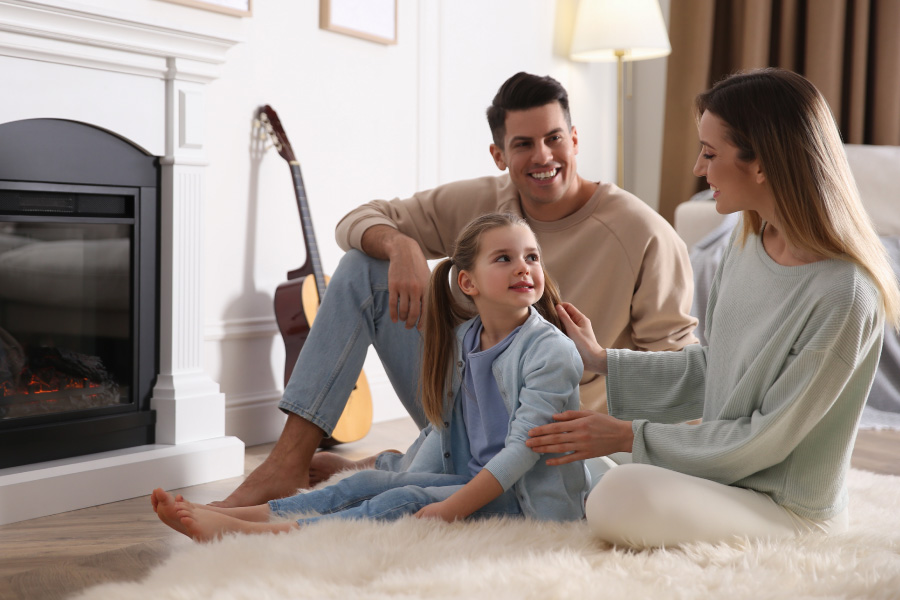
Heating and Cooling Solutions, Service
Furnaces are a worthwhile investment, but, like any homeowner, you want to get the most value and use out of your furnace. To avoid spending money on a new furnace too soon, you can save thousands of dollars with annual furnace maintenance. Regular furnace maintenance helps identify heating repairs before your furnace ever breaks down. It can extend the lifespan of your furnace and maximize your comfort and budget in the long run because it helps your furnace consistently operate at peak performance.
At Mountain Heating & Cooling, we’re your Bozeman HVAC experts and know how to keep your furnace running smoothly with annual furnace maintenance. Read on as we explain how furnaces work, what can happen if furnace maintenance is neglected, steps you can take to prevent your furnace from performing poorly, and the benefits of staying on top of regular furnace maintenance.
Annual Furnace Maintenance: Keep Your Home Warm & Cozy
Furnaces & Their Advantages
In Bozeman, Montana, furnaces are an excellent heating solution for your home. A furnace works by burning propane or oil to quickly produce heat in collaboration with a heat exchanger inside the furnace unit. The heat produced from combustion within the heat exchanger is then transferred throughout a home’s ductwork through forced air. The result is a warm home that stays evenly and efficiently heated.
In addition to warming your home quickly, furnaces have many benefits that make them a good option for home heating, such as::
- They are energy efficient and can save costs on your utility bills.
- Filtration systems within a furnace can help improve air quality and reduce allergens within your home.
- Newer furnaces use less fuel or can be electric, making them an environmentally friendly heating option.
The Cost of Neglecting Your Furnace
Furnaces are known for having long lifespans. A well-maintained furnace has more than 20 years of longevity, so, typically, there is no need to worry about replacing it anytime soon. However, furnaces can break down if they are not maintained, costing homeowners a pretty penny in furnace repair services. If the neglect is extreme, a homeowner may have to invest in an entirely new furnace.
Here’s what can happen if you fail to properly maintain your furnace:
- Overlooked furnaces have decreased energy and operating efficiency because they must work much harder to heat your home.
- Neglected furnaces operate inefficiently, so they have to constantly run to maintain your home’s warmth. This can cause your monthly energy bills to soar.
- In the worst-case situations, a furnace that is not regularly maintained can become a safety hazard, causing issues like carbon monoxide leaks. Every year thousands of people end up in the ER due to carbon monoxide poisoning.
Fortunately, most furnace problems are preventable if you take proactive steps.There are several actions you can take to help avoid furnace troubles.
Steps to Prevent Poor Furnace Performance
If you want to keep your furnace performing at its best, here are a few boxes you can check off to prevent potential furnace issues:
1. Change Your Air Filters Regularly
Furnaces use air filters to remove impurities such as debris and pollutants from the air before it is filtered into your furnace. Clogged air filters can damage your furnace’s compressor and keep your HVAC system from running correctly. We recommend changing your furnace air filter every one to three months. It is best to change 1″ filters every month and 4″ filters every three months. If you need assistance changing your air filters, don’t hesitate to reach out to our team of professionals—we’re here to lend a hand with your HVAC needs!
2. Check Your Furnace’s Air Ducts and Vents
If visible, make sure your air ducts are securely fastened together. Look for any loose connections, cracks, or moisture buildup. Excess moisture on air vents can indicate a more serious problem, such as growing mold, which can be hazardous to your health and require immediate professional service.
When inspecting your vents, look for dust buildup. You can easily remove vent covers and vacuum them clean. Doing so will help improve your home’s air quality. However, it is a good practice to have a professional HVAC technician do a deep cleaning and inspect your home’s entire air duct and vent system at least every other year.
3. Stay on Top of Annual Furnace Maintenance
Have your furnace inspected by a certified Bozeman heating and cooling professional. Trained technicians can often spot malfunctions that might not be common to an untrained eye. It can save costs by identifying furnace problems before they become furnace disasters. At Mountain Heating & Cooling, we offer preferred membership agreements in Bronze, Silver, Gold, and Platinum plans so our customers can easily get the maintenance they need without worrying about hassle or expense.
Benefits Of Scheduling Annual Furnace Maintenance
Scheduling annual furnace maintenance has benefits every homeowner should take advantage of. By proactively caring for your furnace, you are ultimately ensuring your home stays comfortable all year round. It also minimizes the likelihood of unexpected breakdowns or unwelcome emergencies you may encounter. Regular maintenance of your furnace can save you both time and money over the lifespan of your heating system.
7 Advantages of Regular Furnace Maintenance:
- Increases the longevity of your furnace investment.
- Ensures maximum airflow to each room.
- Reduces chances of costly future replacements.
- Improves energy efficiency, which reduces your utility bill.
- Keeps you and your family safe from hazardous situations.
- Reduces in-home allergens.
- Keeps you warm and happy during Montana’s cold winters.
Ready To Schedule Furnace Maintenance?
At Mountain Heating & Cooling, we are your Bozeman heating and cooling experts. Our licensed technicians receive extensive furnace installation and repair training and certification. Our team of professionals will ensure that your furnace runs smoothly and safely so you have peace of mind. Don’t put it off; reach out and schedule an appointment today. We have you covered!
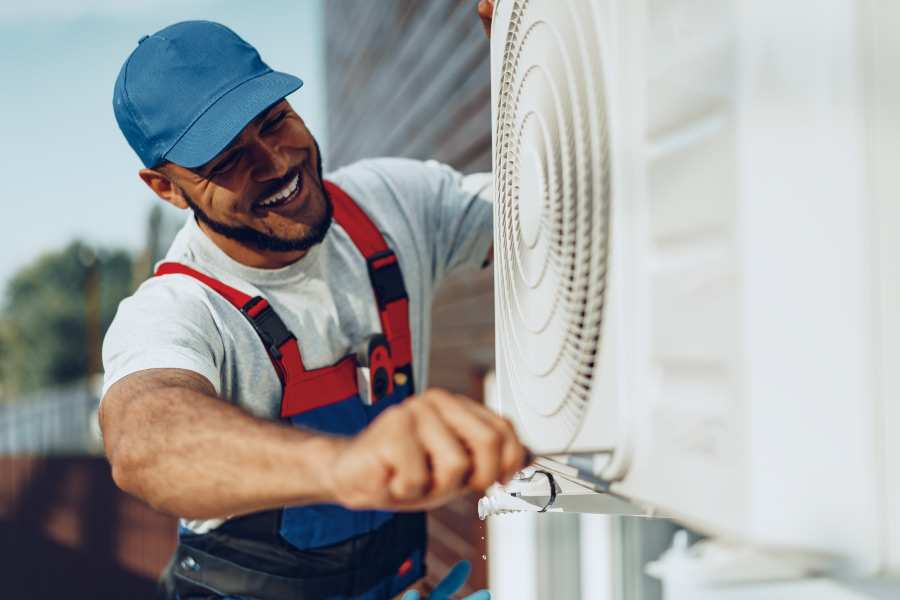
Heating and Cooling Solutions, Service
You’ve just purchased your first home in Bozeman—congratulations! Whether you’re building from the ground up or remodeling to make it the house of your dreams, you’ll need to consider air conditioning installation at some point. Air conditioning is no longer considered a luxury as it was several decades ago. To stay cool on the hottest Montana days, you’ll need an air conditioning unit tailored to your home’s specific cooling needs and designed for durability. In this quick guide, we’ll outline what’s involved with a basic A/C unit installation, costs, and what you should consider before hiring a technician to install an air conditioner.
It’s crucial to note that this is not a DIY guide. Air conditioning installation should always be done by a licensed professional. Our goal is to give you a brief overview of what to expect with a Bozeman air conditioning installation so you can make informed decisions about your HVAC system. We believe in arming our customers with the best information possible so they feel confident in their home care choices.
Quick Guide to Bozeman Air Conditioning Installation
What’s Involved in Air Conditioning Installation
The process of air conditioning installation can be broken down into four stages: the initial visit, the check-in with the installation team, the actual system installation, and the final cleanup and walk-through.
Initial Visit
During the initial visit, a Home Comfort Adviser will review your existing air conditioning system. Or, if you are currently in the building stage, they will go over what type of A/C unit would best suit the needs of the home’s floor plan. They will collect necessary information about your home and personal cooling needs to provide the most accurate estimate possible. The in-home assessment we provide includes a heat gain/loss calculation based on your specific home, measurements of the existing system, and a compatibility check on what types of equipment can be used to serve you. After the visit, you will be provided with estimates for one or more options to choose from. Once you agree on the estimate and installation proposal, you will schedule a time for an installation team to set up the new air conditioner in your home.
Installation Team Check-In
When the installation team arrives to install your air conditioning unit, they will share and review the job information with you. This way, you can see the full details of the job including equipment information and any special instructions given by you to the estimator. After taking a few moments to review the job information and sign off on the process, the installation team will start laying down drop cloths and other protective equipment to keep your home safe and clean. They will also turn off the gas supply and electrical circuits connected to the existing HVAC system.
System Installation
Air conditioning installation is a very involved process, so only trained professionals should install an A/C unit. For an air conditioning replacement, your installation team will remove the existing air conditioner (if applicable), safely reclaim and recycle any refrigerant, and prepare the area for the new air conditioner unit. Preparing the area may include leveling the ground and replacing the pad the unit will be set on. Then, the new unit is installed, which includes installing new indoor evaporator coils, placing new copper refrigerant lines, setting up the new air conditioner condenser, etc. On average, air conditioner system installation takes about eight hours in total.
Final Cleanup/Walk-through
After installation is complete, the team will remove any old equipment, clean up the work area, restore power and gas to the unit, and ensure your home is spotless after they leave. As a TRANE and Mitsubishi Dealer, we do a factor “Start Up” of your new equipment to validate the proper operation, refrigerant levels, and expected performance, which includes testing and adjusting fan speeds and refrigerant levels if instructed. Your installers will also walk you through the work completed and go over any special instructions, safety, maintenance, etc. After this, signatures and payments are collected.
Air Conditioning Installation Costs
The total price of air conditioning installation varies depending on the project. On average, installing a new air conditioner will cost roughly between $5,000 and $15,000. A variety of factors go into the price of an installation project but typically include the following:
- New vs Replacement – An entirely new air conditioning system requiring ductwork will typically cost more than only replacing the air conditioning unit.
- Comfort Level – Everyone has different levels of desired cooling comfort for their home. Whether you rarely turn on the A/C or love the constant cool, your ideal comfort level will contribute to the type of air conditioner unit you choose and how many rooms you need cool air to flow to.
- Home Efficiency – If your home is efficiently designed, it may already do a great job naturally staying cool in the hotter months. However, if you have poor insulation and lots of natural light, you may need a more robust air conditioner to keep your home cool.
- Desired Efficiency – Air conditioners with high energy efficiency typically cost more upfront, but they can save you more money on your utility bills in the long run.
- Noise Level – Different A/C unit models have different levels of noise they put out, so you will want to choose a system that fits your desired level of quiet.
- Choice of System – Depending on your system of choice, a central A/C unit may cost between $5,000 and $13,000. The system you choose depends on your budget and home’s needs.
- Square Footage – Your home’s size will determine the size of the air conditioning unit you need for it. Larger homes need more powerful systems to cool the entire home. An HVAC professional can help you determine which size of air conditioning unit best fits your home’s size by providing an ACCA-approved load calculation.
- Consideration of Heating – An alternative to a standard air conditioner is a heat pump. With a heat pump, you can heat and cool your home. As you plan for efficiency and reducing your carbon footprint, a heat pump can help improve your home’s comfort and efficiency.
- Labor – The amount of work involved in installing your new system contributes to the specific price of your project.
Yea Top-Notch Bozeman AC Installation
To see what your air conditioning installation options are, reach out to our team of Bozeman HVAC professionals. At Mountain Heating & Cooling, our technicians are well-versed in A/C installation. Each technician goes through rigorous training before stepping foot into your home. We understand that air conditioning is a significant investment in your home’s value, so we go above and beyond to make sure you are well informed on what your options are so you can make educated, confident choices. To get an estimate, schedule an appointment with our team today.

Service
Off-seasons like spring and fall are the best times of year to start thinking about your summer air conditioning needs. Summer can quickly get busy with people scheduling A/C appointments and setting up air conditioner installations, so if your air conditioner fails it could mean waiting in the heat until it can be fixed. Getting a jumpstart on updating or replacing your air conditioner can save you a hassle in the future. (If you’re wondering if your air conditioner is on its way out, check out our article “Signs its Time to Replace Your Air Conditioner”).
To get the process going, you’ll need to pick an air conditioner that fits your home’s needs and your ideal price point. There are plenty of options to choose from, so selecting one can be a confusing process. Notably, choosing a brand of air conditioner can be a tricky process in itself. Between energy efficiency, SEER rating, and price point, there are a number of factors to consider when choosing an air conditioner brand. To help you decide on a brand of A/C unit, our Bozeman HVAC team compiled a list of the best air conditioner brands of 2023 so you can pick which brand fits your home’s needs and budget.
Best Air Conditioner Brands of 2023
Trane
Price Range: between $$ to $$$$
Reasons to Buy: Smart home features, rigorous testing procedures, durable features
We believe Trane is one of the best air conditioner brands on the market. The reliability of Trane HVAC systems is renowned, hence its slogan: “It’s hard to stop a Trane.” In fact, Trane has succeeded in winning the title of America’s Most Trusted HVACⓇ System since 2015. Every Trane air conditioner is tested to withstand extreme conditions, so they are extremely durable and long-lasting. Certain Trane model thermostats link to Wi-Fi, so you have ultimate control over your home’s temperature from your computer, tablet or smart phone. Additionally, many Trane air conditioning models are ENERGY STAR certified, meaning they can help you save a few extra dollars on your monthly power bill.
Mountain Heating in Cooling is a Pro Trane Dealer with Train Certified Trane Comfort Specialists. If you have any questions about Trane air conditioner models and which may best suit your needs, we’re here to help. Schedule a consultation today.
Lennox
Price Range: $ to $$$$
Reasons to Buy: Energy efficient, saves money on utility bills, high SEER rated models
If you want a highly efficient, cost-effective air conditioning system, a Lennox air conditioner is for you. Seven out of the nine Lennox air conditioner models are ENERGY STAR certified, and they rate as high as a 28 on the SEER scale. Also, consumers say Lennox air conditioners are some of the quietest A/C units on the market, making them ideal if you want some extra peace and quiet around the house.
Mitsubishi
Price Range: $ to $$$$
Reasons to Buy: Customizable A/C solutions, ductless air conditioning, Trane partner
Whether you want a ductless or ducted A/C unit, a Mitsubishi air conditioner can help meet your cooling needs. Mitsubishi offers a range of innovative A/C solutions, so you can customize your system to meet your home’s needs. Their popular Zoned Comfort SolutionsⓇ allow you to break up your home into zones, so you can adjust the heating and cooling according to each zone’s specifications. Many of these systems are ENERGY STAR certified and have SEER ratings up to 28.2. Plus, Mitsubishi and Trane recently joined together to provide more heating and cooling solutions for consumers, so you get Trane-level quality when you order certain models of Mitsubishi air conditioners.
7 Factors to Consider When Choosing an Air Conditioner
- Comfort Features – Air conditioning condensers come in three comfort models based on the features:
- Best – Variable Condenser provides most even and most efficient of cooling systems, keeping the temperature change to a minimum and matching lower fan speeds to maintenance levels of cooling
- Better – 2 Stage Condenser provides two levels of cool: low and high. This is a great complement to a Variable Fan 2 Stage Furnace
- Single Stage – 1 Stage Condenser lowest cost initially, less efficient than other options. Can be installed on a Single Stage, Variable 2 Stage and a Fully Variable Furnace but will only operate in 100% cooling making your temp changes from on to off approximately 4 degrees from the call for cool to rest.
- Energy Efficiency – Selecting an energy-efficient air conditioner can help save you money in the long run. Many of the best air conditioner brands on the market are ENERGY STAR certified, meaning they meet the Environmental Protection Agency’s (EPA) strict standards for using less energy. A good SEER rating also indicates energy efficiency. Seasonal Energy Efficiency Ratio (SEER) is the ratio of an air conditioner’s cooling output over a cooling season divided by the energy used in watt-hours. The minimum standard SEER rating is 13, but many of the more efficient models on the market have a rating as high as 28.
- Price – It’s important to consider your budget when choosing an air conditioner. Keep in mind that systems with a higher price tag tend to be more efficient, which can make them less expensive to operate in the long run.
- Size – Ensure your chosen A/C unit is a suitable size for your desired location. An ACCA Approved Load Calculation IS THE ONLY WAY TO TRULY SIZE YOUR SYSTEM. If an A/C unit is too large or small, it can actually be less efficient for your home and use too much energy. A professional HVAC technician can help you pick an air conditioner with the right dimensions for your home. They can assess your home’s available space to ensure you choose an A/C unit with the right dimensions.
- Quality – Choosing an A/C system that stands the test of time is important to get the most out of your air conditioner. You want to choose an A/C system that will serve your home well for decades, so selecting a unit with reliable, well-made components is crucial. More expensive systems are often higher in quality, but it’s important to focus on an A/C unit’s unique specifications to pick the best option for your home. Our HVAC technicians at Mountain Heating and Cooling are highly-trained and understand the difference between various A/C unit specifications and features, so consult with our technicians if you need help choosing an A/C unit.
- Noise – Noise must be considered when choosing a new air conditioner unit, because it can affect your comfort and quality of life. A noisy air conditioner can disturb your sleep quality, productivity, neighbors, and ability to relax, so select an air conditioner with a noise level that promotes your overall comfort.
- Warranty – Warranty is an important factor to consider when purchasing a new air conditioner unit because it can protect you from unexpected repair costs and provide peace of mind. An air conditioner warranty can provide coverage for repairs or replacement of defective parts and systems, saving you the cost of out-of-pocket expenses. Additionally, a warranty can extend the lifespan of your air conditioner unit. By having regular maintenance and repairs covered under the warranty, you can ensure that your unit is functioning at optimal levels and prevent breakdowns that could shorten its lifespan.
Let’s Chat about The Best Air Conditioner Brands for Your Home
Your home is unique, so it’s important to choose an air conditioner that fits your home’s needs, is energy efficient, and lasts for years. If you need an expert’s opinion on which air conditioner unit may be best for you, chat with our Bozeman air conditioning installation specialists. At Mountain Heating and Cooling, we take the time to understand your home and budget so we can best serve you and your home. Your comfort is important to us, so we provide only the best in customer service and heating and cooling services. To schedule an appointment to find the best air conditioner brand for your home, fill out a contact form or call us at (406) 586-4007.
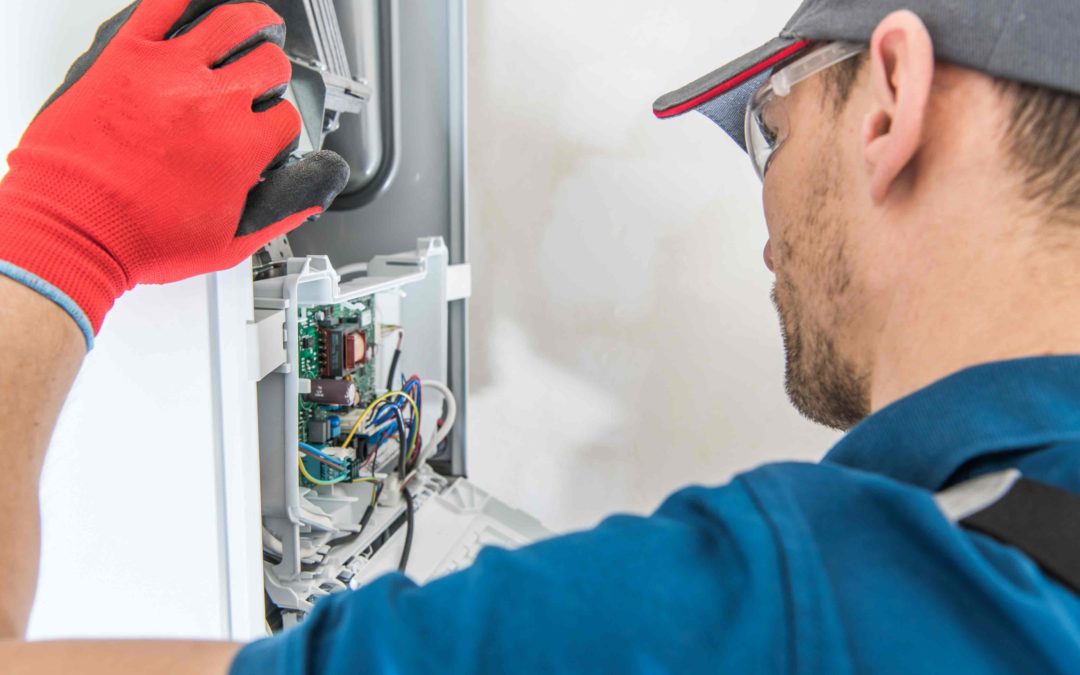
Service
The last thing you want during wintertime is to come home to a cold house. Having an operational furnace keeps you and your family cozy during the chilly season, so proper furnace maintenance is key for comfort. The fall is the perfect time to start checking on your heating & cooling system. Starting a few months ahead of time gives you enough time to inspect your furnace and call professionals to make the proper repairs. So you are ready for the snow and ice, here are seven tips to help you prepare your furnace for winter.
1. Have A Professional Checkup Before You Turn On
Your best option is to have a professional do a full inspection of your furnace before the winter hits. In fact, hiring a professional can help you save money in the long run. A professional trained in furnace maintenance can ensure furnaces are cleaned and repaired efficiently. Also, they often spot issues untrained eyes miss. HVAC professionals will be able to quickly fix any furnace issues before they grow and, potentially, ruin your entire heating system.
For professional help in your furnace maintenance needs, reach out to Mountain Heating & Cooling today.
2. Inspect Your Air Filters
Depending on your system air filter, filters need to be replaced every 1 to 3 months. Change 1” filters monthly, and 4” filters every 3 months. If you have more allergens, dander, or pet hair in your home, you may need to replace the filter more often. These factors can obstruct your heating system and prevent air from circulating throughout your home.
3. Turn On Your Thermostat
If your thermostat is not working, then your furnace may not be working. Turning on your thermostat to see if it is functioning is a good, initial step to check your heating system’s health.
If the system is working, the thermostat should turn on without any problems. If the heat doesn’t engage, you may need to either replace the thermostat or check batteries on the thermostat or breaker or fuse for power issues. If it continues to not work, you should call in a professional to address the issue.
4. Replace Old or Outdated Furnaces
Sometimes, old furnaces cost more to repair than they do to replace. Furnaces that are over 20 years old can be prone to issues that require continual maintenance to keep them running. To get the opinion of a professional about whether your furnace should be replaced or not, contact Mountain Heating & Cooling today.
5. Check Vents
Vent blockages can wreak havoc on your heating system. Blocked air vents can cause your furnace to work harder. This increases the system’s temperature and increases the risk of a fire. Before winter, clear away items that obstruct vent airflow, including furniture, toys, equipment, and plants.
6. Clean Your Ducts
Proper air duct performance and condition is often overlooked when considering the upkeep of your heating & cooling system. Clean air ducts deliver fresh air into your home, so cleaning your air ducts every few years is part of an important maintenance plan. Check your air ducts for cracks and leaks at least every two years, and repair accordingly. Additionally, examine your air ducts for cleanliness and clean every few years to improve your indoor air quality.
7. Examine Your Heat Pump
Some homes use a heat pump instead of a furnace for heating. While furnaces burn oil or gas to heat homes, heat pumps use an electrically powered condenser (similar to an air conditioner) to transfer heat from outdoors to the inside of the home utilizing your ducted system.
If you heat your home using a heat pump, proper maintenance is key. The U.S. The Department of Energy indicates a well-maintained heat pump can reduce your home’s energy consumption by 10 to 25 percent. Heat pump maintenance includes removing plants and clutter from around outside parts, inspecting and tightening electrical connections, and lubricating moving parts like motors.
Fall is the time to get a jump start on your home’s furnace maintenance so you can stay warm and safe in the winter. Having professionals take care of your furnace is the most efficient way to ensure every aspect of your HVAC system is running as it should. When your family’s comfort and home’s quality are both on the line, you can trust Mountain Heating & Cooling to ensure everything is operating as it should. We know heating & cooling maintenance from start to finish, and we take the time to know what your home needs to run smoothly. Give us a call to arrange an appointment today.
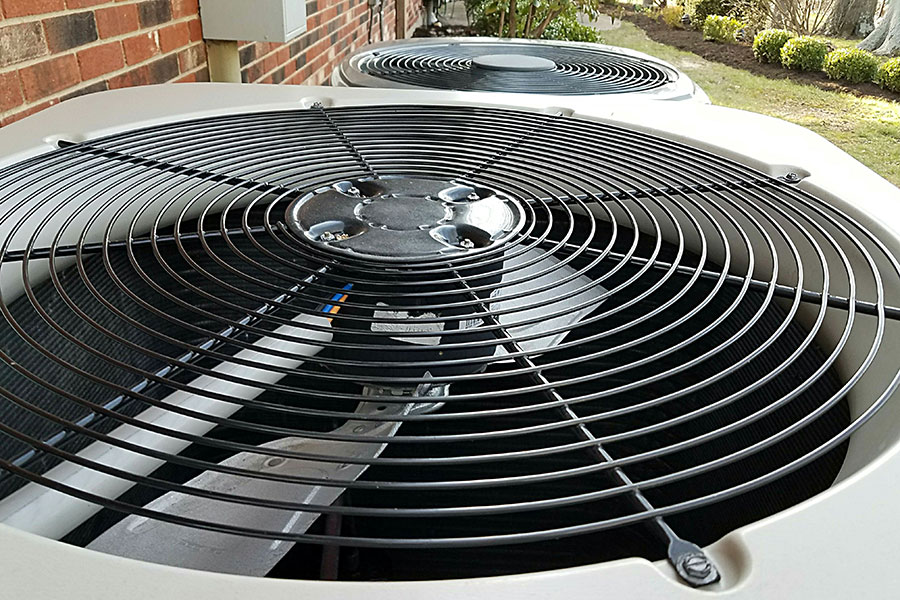
Heating and Cooling Solutions, Service
During the hot months, you want to make sure your air conditioner is blowing ice cold, clean air. For that to happen, your unit will need to be running smoothly and efficiently. Air conditioner repairs can be costly, and no one wants to deal with the air conditioner leaking or failing on a hot summer’s day. To avoid that, it pays to learn about common air conditioning problems so that you can take preventive measures to avoid huge repair bills. At Mountain Heating & Cooling, we’ve put together a list of four of the common things to watch out for this summer so you can keep your home cool.
Air Conditioner Leaking
One of the common questions we get from folks is “why is my air conditioner leaking?”. Air conditioners can leak for a variety of reasons, the most common being a clogged condensate drain line. Over time, this line can become clogged with debris like dirt or dust, which can lead to the unit leaking inside your home. Essentially, when the condensate drain line gets clogged, water can’t escape and drain to the outside of the home, so instead, it gets backed up and leaks water inside your home. Air conditioner leaks can also stem from dirty air filters or low refrigerant. As the refrigerant level gets lower, the pressure inside of your AC system lowers, too. This can also lead to your evaporator coil freezing, creating a wet mess.
Air Conditioner Freezing Up
There are a few reasons why an air conditioner might freeze. This can range from insufficient airflow to low coolant levels to blower motor problems. If your unit is freezing, we recommend getting a qualified technician to take a look so that they can diagnose the issue and get it back up and running quickly.
Air Conditioner Not Blowing Cool Air
Over time, dust, dirt, and residue can build up on the air filter and block the airflow of your unit. This can affect the condenser unit and limit how much cool air it can blow. Changing the air filter regularly will help make sure your unit is blowing ice-cold air throughout the summer.
Air Conditioner Making Noises
There are a few different sounds that air conditioners can make, and it will vary depending on what the problem is. For example, a refrigerant leak will emit a hissing sound, a fan motor issue can produce a screeching sound, and faulty electrical components can produce a buzzing sound. If you notice any unexpected sounds coming from your unit, call in a qualified technician who can take a look and pinpoint the issue quickly. We can help! Give us a call and we can take a look.
How often should I service my air conditioner?
To avoid air conditioner leaking and to gain maximum air conditioner efficiency, you should make sure your air conditioning unit is serviced regularly and by qualified experts. There is some wiggle room around how long you can leave it between air conditioner repairs, though we recommend getting your air conditioning unit serviced once per year. Dirt and neglect can cause system inefficiency and failure, and to make sure that the unit is functioning efficiently and safely, it pays to perform routine maintenance. Proper maintenance by a qualified technician will prolong the unit’s life, keep it running efficiently, prevent air conditioner leaking and issues, and make sure that your home’s air is clean, and prevent future problems.
The last thing anyone wants to deal with on a hot summer’s day is an air conditioner leaking or having issues. At Mountain Heating & Cooling we’re here to help. Let’s schedule a maintenance check now to prevent any issues and to make sure your unit is working efficiently for the rest of the summer. Give us a call to arrange an appointment today.
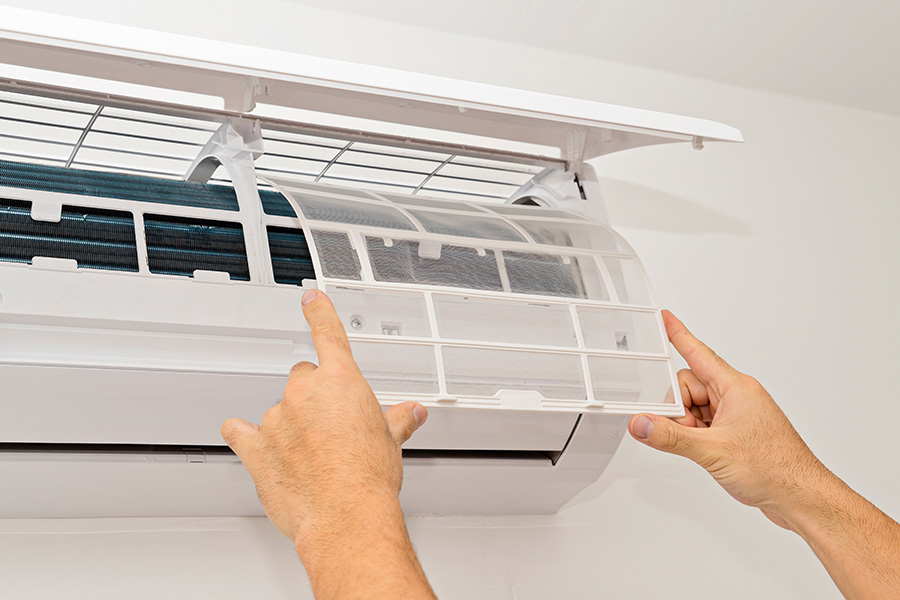
Air Purifiers, Service
Indoor air pollution is a big consideration as a homeowner. The last thing any of us want is for our home’s air to be unhealthy for our family. This is even more of a factor during forest fire season, when keeping the air safe and reducing the amount of smoke in your home becomes crucial. Folks often ask us how they can keep their home’s air clean during the fire season, and which house air filters are best. If you have a heating and cooling system, your air conditioner or furnace will have an air filter in it. But are those built-in air filters good enough to keep your home’s indoor air quality as high as you want it to be?
In terms of house air filters, you have a couple of options:
- Relying on your HVAC air filter
- Investing in a standalone air purifier or air cleaner
HVAC Air Filters: Should I run my AC during fire season?
If you have a furnace or an air conditioner, you should have an air filter. Air filtering is not the primary function of these units, though most will have a filter installed in them. The quality of furnace air filters or air conditioning filters will depend on things like the model of the unit, its maintenance history, and the settings it has. All of these will have a bearing on how much risk there is of wildfire smoke and other pollutants circulating through your home.
When fire season starts, one of the first things you’ll want to do is to turn off any settings that allow the intake of outdoor air into the indoor air space. Then, you’ll want to turn off any window air conditioning units that can pull in contaminated outdoor air into your home. To get the most air cleaning value out of your AC unit, you’ll also need to regularly maintain it and replace the filter. That will help to minimize the risks of pollutants— like wildfire smoke— entering your home’s environment.
Standalone House Air Filters
Air filters that are included in your furnace and air conditioner are not as thorough as air purifiers and cleaners that are designed purely to clean your home’s air. To gain the best air filtration for your home, it’s worth considering an air purification system as well. A couple of air purifier options that we carry are:
- Trane CleanEffects™ Air Cleaner: This model uses cutting-edge technology that creates cleaner, healthier air for your home. It removes up to 99.98% of airborne particles. Many room filters and HVAC unit air filters aren’t as good at filtering out tiny particles like dust, smoke, and bacteria, which are small enough to get deep into your lungs because they aren’t filtered well by your nose and throat. This Trane air cleaner is great at catching those tiny particles, and so can reduce the presence of smoke, dust, pollen, and even bacteria in your home.
- GPS Series Plasma Purifiers: These units are simple to maintain, cost effective to install, and are easy to move around. They use an ionizing technology that drops the smoke out of the air, and as a bonus they’re also great for eliminating odors in the home!
Air Filter vs. Air Purifier: Do I Really Need Both?
Most HVAC system air filters will do a decent job of filtering out larger dust and dirt particles from the air, though they will need to be regularly maintained and they simply aren’t designed to trap smaller particles like smoke. They are designed to keep the HVAC running optimally and to reduce wear and tear—not to make your indoor air perfectly clean. We recommend investing in an air purifier to take your indoor air quality to the next level, especially during fire season. This will be the best option for getting the cleanest air and the best house air filters available.
Wildfire season is the time when we are often the most conscious about how clean and safe our home’s air is. When fires start, it can feel daunting to try to find the right solution for your family and home. We can help you find the best air filter for wildfire smoke! At Mountain Heating & Cooling we have years of experience in finding the perfect solution. We know air cleaners inside and out, and we will take the time to get to know your needs to make sure we fit the right system and model to your home. Give us a call to arrange an appointment today.






